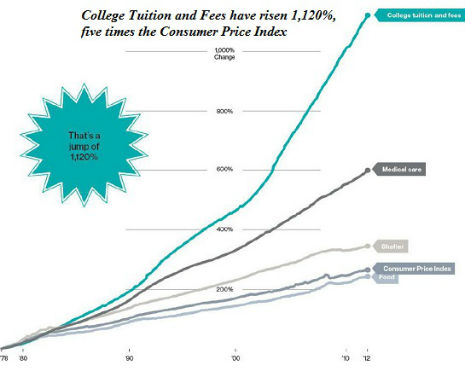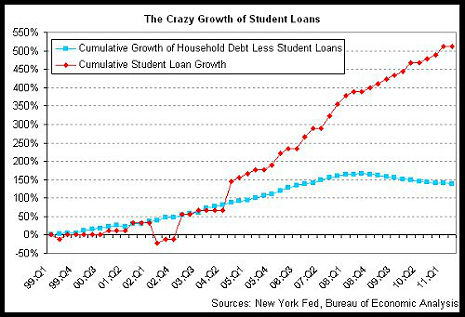
Some July 4th thoughts on revolution as a process rather than an event from Charles Hugh Smith. His newest book is Why Things Are Falling Apart and What We Can Do About It
The next American Revolution will not be an event, it will be a process. We naturally turn to the past for templates of the future, but history has a way of remaining remarkably unpredictable. Indeed, all the conventional long-range forecasts made in 1900, 1928, 1958, 1988 and 2000 missed virtually every key development—not just in the distant future, but just a few years out.
The point is that extrapolating the present into the future fails to capture sea changes and developments that completely disrupt the supposedly unchanging, permanent Status Quo. The idea that the next revolution will take a new form does not occur to conventional forecasters, who readily assume the next transition will follow past critical junctures: armed insurrection against the central authority (The first American Revolution, 1781), civil war (1861) or global war (1941).
I submit that the next American Revolution circa 2021-23 will not repeat or even echo these past transitions. What seems likely to me is the entire project of centralization that characterized the era 1941-2013 will slip into irrelevance as centralization increasingly yields diminishing returns.
Everything centralized, from the Federal Reserve to the Too Big To Fail Banks to Medicare to the National Security State depends on the Federal government being a Savior State that must ceaselessly expand its share of the national income and its raw power lest it implode. All Savior States have one, and only one trajectory—they must ceaselessly expand and concentrate wealth and power or they will fail.
They are like the shark, which dies once it stops moving forward: the Savior State must push forward on its trajectory of expansion or it expires.
Stasis is not possible, nor is contraction; the promises made to the citizenry cannot be withdrawn without political instability, but the promises cannot be kept without fatally disrupting the neofeudal financialized debtocracy.
You see the dilemma: The Savior State cannot stop expanding, but the financial system that generates its revenues can no longer support its vast machinery of debt and phantom collateral. This is why I suggest all the centralized concentrations of wealth and power will either implode or fade into irrelevance.
If all the phantom wealth and collateral vanishes in a market clearing event, the Federal Reserve will simply become irrelevant to the vast majority of people. A handful of nimble speculators may well benefit by picking over the carcass of financialization and centralized omnipotence (i.e. central banking), and perhaps the 1/10th of 1% will still have enough assets influenced by the Fed to care, but the forces of disruption will replace centralization with decentralization.
Here is another example: Medicare may not cease to exist, but it will become increasingly irrelevant to most people because it will not longer function. The remaining doctors willing to treat Medicare patients will be working 13-hour days for sketchy pay, and as each one burns out and leaves the system, the system contracts. Eventually it contracts to the point of irrelevance.
The revolution will be in work and social innovations enabled by technology. The conventional view is that technology will magically enable the permanence of the present; this will be proven incorrect, as what technology enables is not the waste, entitlement and centralization that characterize the present but social innovations, some of which are already visible.
If we sought to summarize the profound transformation ahead in one sentence, it would be this: Wages are no longer an adequate model for distributing the surplus generated by the economy.
The current Savior State model responds to this by increasing taxes on the dwindling minority with fulltime jobs and increasing entitlement payments to all those without government or private-sector jobs. This model will collapse, politically, socially and economically, as no society or economy can squander half or more of its productive labor force while increasing the burden on the dwindling cohort of productively employed. The inevitable result of this dynamic is a destabilizing tyranny of the majority.
Technology is not just disrupting old industries and companies, it is disrupting the entire Savior State/cartel-capitalism model. The disruption has barely begun, but it will pick up speed over the next decade.
I suspect the next American Revolution will begin in the 2015-16 timeframe. A series of interlocking crises will lead to reforms that preserve the Savior State/ cartel-capitalism for another few years, at a lower level of consumption, i.e. burn rate.
But the process of revolution will be far from complete; this initial response of the centralized neofeudal debtocracy will buy time for the Status Quo, and every conventional onlooker will be infused with optimism and hope that the system established in the Great Depression, World War II and its Cold War aftermath—the secular religion of consumerism (i.e. aggregate demand), permanent war footing and the National Security State, and universal dependence on the Savior State and its ceaseless expansion of concentrated wealth and power—will continue.
But this Springtime for the Savior State/cartel-capitalism partnership will be brief, and by 2018-19 all the systemic flaws and disruptive trends will reassert themselves with renewed vigor.
The entire current model of governance, social order and the economy will be revolutionized not by overthrow but by the process of irrelevance. What will become relevant will no longer be in the control of the Savior State or its partner, financialized cartel capitalism.
Those currently holding all the concentrated power and wealth cannot believe they will become irrelevant, but that’s the result of projecting the present as if it is permanent and immutable.
The new system will be better, more humane, more flexible, more transparent, with more opportunity, for it will be everything the current corrupt, sclerotic, parasitic and exploitative system is not.
Previously on Dangerous Minds from Charles Hugh Smith:
Concentrated wealth and power are intrinsically sociopathological by their very nature
Global Crisis: The Convergence of Marx, Orwell and Kafka
Will crushing student loan debt and worthless college degrees radicalize the Millennial generation?
Wage Slaves: Are You Loving Your Servitude Yet?




















